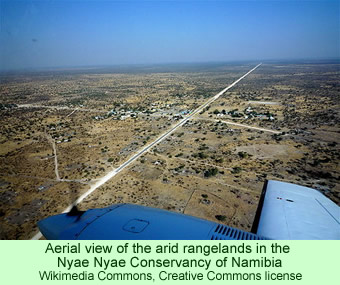The Nyae Nyae Development Foundation of Namibia is helping the Ju/’hoansi, formerly a hunting and gathering society, to cope effectively with the realities of global climate change. A news story a year ago described how the NNDFN emerged from its troubled beginnings to take up the climate change issue and how it has become an important Ju/’hoansi management and development organization in the process.
 The news last year at this time was based on presentations at the 18th Rangeland Forum in Namibia, where speakers described a project that, if funded by the European Union, would focus Ju/’hoansi rural land managers on specific objectives and would allow them to cope with the realities of lessening rainfall.
The news last year at this time was based on presentations at the 18th Rangeland Forum in Namibia, where speakers described a project that, if funded by the European Union, would focus Ju/’hoansi rural land managers on specific objectives and would allow them to cope with the realities of lessening rainfall.
A report from the 19th Rangeland Forum, held at Otjiwarongo, Namibia, on Tuesday, September 15, suggests that the project is making a good beginning. Lara Diez, the Director of the NNDFN, provided some details as to how the project is trying to help the Ju/’hoansi adapt their land use patterns to better cope with climate changes.
According to the news story, Ms. Diez indicated that the people in the Tsumkwe area are at severe risk of the harsh effects of climate change due both to their remote location and to their complete reliance on the forces of nature. The point of the project, she said, is to maximize the food security of the people in both the Nyae Nyae Conservancy and the N≠a Jaqna Conservancy immediately to the west, the homelands, respectively of the Ju/’hoansi and the closely related !Kung people.
The specific goals of the project are to use the tools of conservation agriculture to increase crop yields, to improve livestock, to prevent land degradation due to over-grazing, and to reduce the fires that destroy and degrade the land.
Ms. Diez described the severe problems facing the two conservancies from illegal intrusions by outsiders and fencing by non-San people, and the fact that judgments against invaders and outside settlers have not been carried out by the authorities. But more positively, she said that the project is encouraging the communities themselves to address the challenges they are facing.
She said that the project is focusing on communities that are already demonstrating their willingness to tackle problems when they see them developing. It supports rangeland management and agricultural projects that are already under way. She hopes to focus on communities that are making good progress and to designate them as “role model villages.”
The project has distributed a booklet printed in three different languages about coping with climate change, and it is also developing a periodical that will have climate change news and tips. Rangeland, agriculture, grazing, and herding activities are now planned for the project. It has also developed a Fire Management Manual along with a week-long training course for rangers and management personnel.
Ms. Diez indicated that the project is working with stakeholders to generate baseline data of such factors as rainfall, livestock productivity, and human health in the villages. It plans to measure the outputs from fields and gardens in order to provide an assessment of changes in management approaches. The project is being supported by the EU Rangeland Monitoring Project, among other donors.